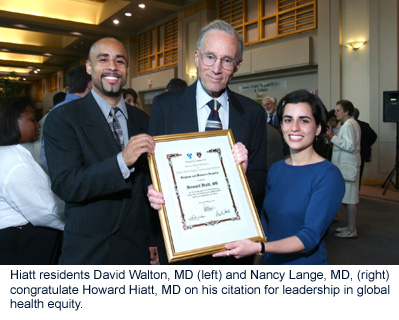BWH Welcomes New Social Medicine Residents

Both Walton and Lange are receiving an education that focuses on not only the
treatment of diseases of poverty but also learning the corresponding, critically
important cultural contexts. This residency, one of only a handful across the
country, was established through BWH’s Division of Social Medicine and Health
Inequalities. In conjunction with Partners in Health, the division provides patient
care, training and conducts research throughout inner-city Boston, Haiti, Peru
and Russia. These programs focus primarily on treating and preventing infectious
diseases, including HIV/AIDS, multidrug-resistant tuberculosis (MDRTB) and malaria,
though its scope will expand over time to include other major acute and chronic
diseases.
Under the direction of Paul Farmer, MD, PhD, Joel Katz, MD, and Jennifer Furin,
MD, PhD, junior and senior fellows such as Walton and Lange work closely with
a mentor, a recognized expert in a field relevant to his or her research interests.
As part of this unique course, the first two residents participate in a specialized
curriculum that includes 11 months of fieldwork, research and coursework, comprehensive
mentorship in clinical medicine and health disparities, and supplemental foreign
language training.
For Lange, being selected for this residency program was an opportunity for
her to formally continue the work she has done in international health since entering
medical school. She has spent time in Salvador, Brazil working on an epidemiologic
study on leptospirosis, and in Dakar, Senegal, pursuing an elective in HIV medicine.
According to Lange, “In both of these experiences, I was inspired to see
how physicians can be empowered to work towards the goals of fighting poverty
and the inequities that lead to disease. I also learned about the importance in
resource-poor countries, not only of gaining financial assistance, but also of
having the organization and infrastructure to successfully utilize financial resources.
This residency is helping me be part of the solution to these challenges.”
Walton’s motivation comes from similar experience that has inspired him
to use his education and training to benefit HIV-positive patients without access
to healthcare. His work over the past five years at a clinic in Haiti has shown
him firsthand the effects of health inequities. “What is most striking,
to me, are inequalities of access to care. I am hoping this residency will enable
me to address patients around the globe – whether in Roxbury or the millions
in sub-Saharan African – with HIV who do not have access to care. I hope
to be a part of this new breed of physicians, trained to address one of the most
pressing issues of our time: health and access to care as a fundamental human
right.”